

Board Observers Weekly - June 17th, 2014. Privacy As A Competitive Vector. Our portfolio company DuckDuckGo has made privacy a big part of its value proposition.
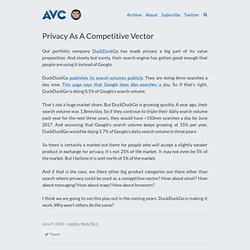
And slowly but surely, their search engine has gotten good enough that people are using it instead of Google. DuckDuckGo publishes its search volumes publicly. A Dozen Things I’ve Learned From Marc Andreessen. Marc Andreessen is able to explain himself so well that I should have less commentary to add to the quotations in this post than usual.
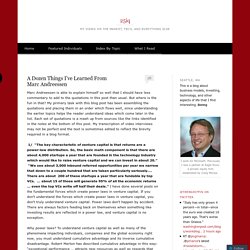
But where is the fun in that? My primary task with this blog post has been assembling the quotations and placing them in an order which flows well, since understanding the earlier topics helps the reader understand ideas which come later in the list. Each set of quotations is a mash up from sources like the links identified in the notes at the bottom of this post. My transcription of video interviews may not be perfect and the text is sometimes edited to reflect the brevity required in a blog format. 1/ “The key characteristic of venture capital is that returns are a power-law distribution. Why power laws?
2/ “We think you can draw a 2×2 matrix for venture capital. “The entire art of venture capital in our view is the big breakthrough for ideas. 3/ “You want to have as much ‘prepared mind’ as you possibly can. 12/ “Software is eating the world.” Justin Mares. You’ve decided you want to do something in this world.
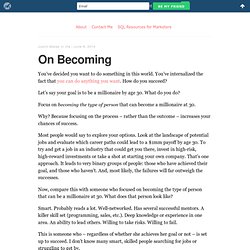
You’ve internalized the fact that you can do anything you want. How do you succeed? Let’s say your goal is to be a millionaire by age 30. What do you do? Focus on becoming the type of person that can become a millionaire at 30. Why? Most people would say to explore your options. Now, compare this with someone who focused on becoming the type of person that can be a millionaire at 30. Is it Time for You to Earn or to Learn? This is part of my Startup Advice series I often have career discussions with entrepreneurs – both young and more mature – whether they should join company “X” or not.
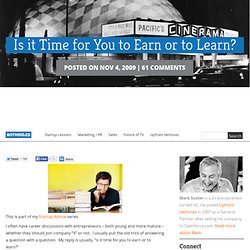
I usually pull the old trick of answering a question with a question. My reply is usually, “is it time for you to earn or to learn?” Let’s face it. If you’re thinking about joining as the director of marketing, product management manager, senior architect, international business development lead, etc. at a startup that has already raised $5 million the chances of you making your retirement money on that company is EXTREMELY small. Yet I often hear people asking about these types of opportunities express their questions to me whether I think this company is going to be a big hit.
And let’s say that it took 4 years to exit – that’s $31,250 / year. Why Startups Should Train Their People. Teachers teach and do the world goodkings just rule and most are never understood—KRS-One, My Philosophy When I first became a manager, I had mixed feelings about training.
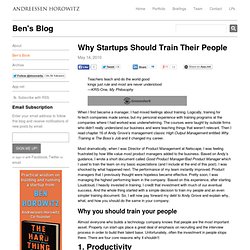
Logically, training for hi-tech companies made sense, but my personal experience with training programs at the companies where I had worked was underwhelming. The courses were taught by outside firms who didn’t really understand our business and were teaching things that weren’t relevant. Then I read chapter 16 of Andy Grove’s management classic High Output Management entitled Why Training is The Boss’s Job and it changed my career. Most dramatically, when I was Director of Product Management at Netscape, I was feeling frustrated by how little value most product managers added to the business.
Why you should train your people Almost everyone who builds a technology company knows that people are the most important asset. 1. Training is, quite simply, one of the highest-leverage activities a manger can perform. Class 4 Notes Essay. Peter Thiel’s CS183: Startup - Class 4 Notes Essay Here is an essay version of my class notes from Class 4 of CS183: Startup.
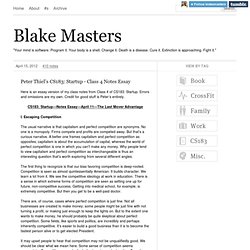
Errors and omissions are my own. Credit for good stuff is Peter’s entirely. CS183: Startup—Notes Essay—April 11—The Last Mover Advantage I. The usual narrative is that capitalism and perfect competition are synonyms. The first thing to recognize is that our bias favoring competition is deep-rooted. There are, of course, cases where perfect competition is just fine. It may upset people to hear that competition may not be unqualifiedly good. A law school anecdote will help illustrate the point. Years later, after Peter built and sold PayPal, he reconnected with an old friend from SLS.
This is not to say that clerkships, scholarships, and awards don’t often reflect incredible accomplishment. That seems true, but it also seems odd. Just look at high school, which, for Stanford students and the like, was not a model of perfect competition.